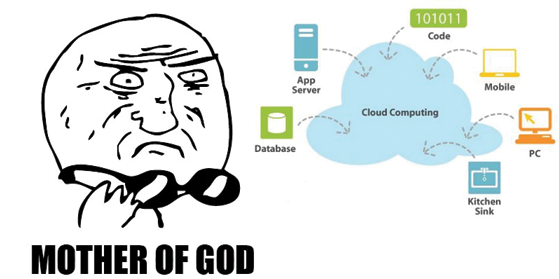What is cloud computing?
Cloud computing is basically outsourcing processing/data storage to somewhere else, that you don,t need to know. Lets call that place the cloud. [ Although most of the outsourced stuff is in to India, but sadly, the cloud is not in India. ]
For this, one important thing is cheap + fast internet. You can not outsource the calculation of L{sqrt(1+ ( sin(log(tan(cos(x)))) )^2)} on a 32 kbps connection, you will obviously get to the answer more quickly while doing it all in our mind. Or, maybe not. The point is, there is a trade-off, which is?
Should I store nyan cat videos on my PC, or watch them on YouTube when I feel like.
It’s obvious that you don’t save videos from YouTube on your computer. Because you cannot. There is too much content, and you have an internet connection decent enough for all your cat fetish. But, you do download a few music videos from VEVO in HD via sites like savevid.com, just because you watch them enough times that it is logical to keep a copy on your hard drive.
So, when internet connections become faster, I won’t need a big hard drive?
No. Internet connection speed is not the only thing that is increasing in this equation. The quality of content also increases. And so does file size. Maybe you will be watching 3D videos on YouTube in a little while. Also, there are newer compression technologies being discovered all the time, that can pack in more quality content in lesser size [ remember the time when your DVDrips were 700MB in size, and then suddenly there were BRRIPS in 500MB all over thepiratebay.org?! ]. There’s one more factor, the industry standard. Blu-Rays sold on the market are still a whopping 50 GB in size. So basically, if suddenly the internet becomes dort cheap, and YouTube videos reduce drastically in size, and nothing substantial happens to hard disks, you might not need them anymore.
Ok, this was about outsourcing data? How do you outsource processing?
A genuine example for this would be the ‘kindle fire. It outsources the process of loading a webpage. Whenever you open one, it first gets crunched in the cloud, minified in size and then is send to the Tablet. This is because 1) Kindle is a mobile device, and mobile internet is not as fast as what you get in landline connection for PCs. 2) Mobile devices have tiny processors and cannot handle a lot of processing. This is also a trade-off with respect to battery life. In a mobile device battery life is more important that being able to calculate the Laplace transform of sqrt(1+ ( sin(log(tan(cos(x)))) )^2). Which, of course, you can do in your mind.
Mobile computing is the real space where cloud computing will affect us in the near future. And, about your image editing moving from Photoshop to picnik.com. Well not likely. It’s processors that follow Moore’s law, not internet connections.
The heavy lifting stuff will always happen on your desktop, but you will continue to use more and more cloud based services on it
Gmail [ remember the Outlook era? Even I don’t] DropBox, Picnik., Bookmarking sites, Spotify/GrooveShark and tons of such services will continue to evolve, taking more of your life to the cloud, more on your mobile device than on your PC. But, local computing isn.t going anywhere.
Further reading
– How Cloud Computing works? [ HowStuffWorks ]
– Cloud Computing [ Wikipedia ]
Do you think cloud computing is the Mother Of God, leave your thoughts in the comments below.

Leave a Reply